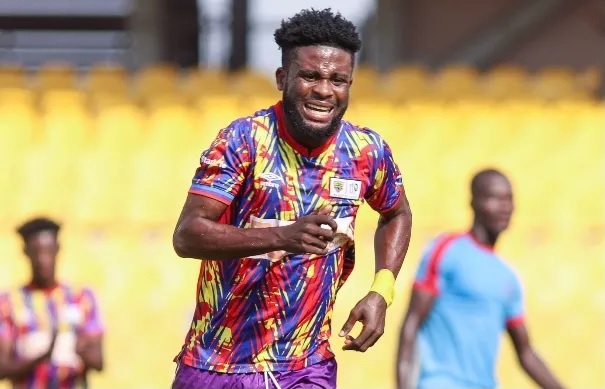Daniel Afriyie Barnieh
EVERYONE WANTS promotion at their workplaces, right? That’s a no-brainer no matter the kind of work you do. So, look at this example.
An intern, who has been at Joy FM for two years, getting employed full-time. That is a dream come true. Progressing from just a regular employee to becoming an editor in whichever department he or she works, is a big promotion that comes with financial packages. And people are always working and looking forward to it. It’s not quite the same way for footballers but it’s a similar one. Unlike journalists, who will not say it publicly that it’s their dream to work at the BBC, CNN, or Aljazeera, almost all Ghana Premier League (GPL) players will tell you it is their dream to play abroad, if not Europe precisely. That’s why I see this post-match comment from Hearts of Oak’s Daniel Afriyie Barnieh as not only a fitting reply to the question. It is also revealing the general wish of most GPL players. “It is the dream of every Ghanaian footballer to travel abroad and that is not anything new. Won’t you love to work at the BBC if you get the chance?” That’s the 21-year-old’s response when asked after the 2022 MTN FA Cup final if he’d stay with the Phobians or move abroad if he gets a good offer.
Why Players Leave After Only One Good Season Meagre Salaries: When you ask people why they choose certain professions, they’d give you varied reasons. However, making a living from your work is central to all that. Football in the Ghanaian society, years back, is perceived to be for the poor. Though inaccurate, when you listen to the stories of many footballers, who rose from poverty to become the breadwinners of their families, you’d think it’s true. The feeling you get when you speak to GPL players or people who deal with them daily is that playing in the Ghanaian league is like pursuing tertiary education to land that dream job after graduation. Club administrators believe they are preparing these players for the bigger leagues abroad, not a place to make money. “Salaries are not enough to take care of the needs of these players, they are not paid regularly,” Collins Atta Poku, a renowned sports journalist who has close ties with GPL clubs, said. “I can make a case for two clubs in Kumasi and one in the Brong Ahafo area; the highest paid players were taking home GHC500 while the least paid were on GHC150 salary a month. “These things were breaching labour laws but nobody bothered [to take it up] because there’s always this condition that they are going to get winning bonus if they win games. “Some of these teams could go like eight months without paying the players. “When players complain, what club owners tell them is that, I’m giving you a platform to hone your skill. This is not where you have to come and make money.”
What you can infer from Atta Poku’s comments is that even club owners concede that they are nurturing players for the big-money leagues overseas.
Infrastructure: One thing that is not changing for good, if not getting worst, is football infrastructure. Teams don’t have training facilities; match venues are deplorable and horrible to watch on TV. After all, Arsene Wenger was right. “Kylian Mbappe has African roots but was trained in Europe,” the former Arsenal manager said during a coaching conference in Germany in July 2022. “If he’d been born in Cameroon, he wouldn’t have become the striker he is today.” So, in their bid to become world-class, GPL players will continue going to where world-class talents are nurtured. The failure of Ghanaian clubs in Africa footballers always want to play where attention is on them consistently. The Ghanaian clubs are, however, failing them with their recent humiliations in Africa. At the moment, even Hearts of Oak and Asante Kotoko cannot offer a footballer two consecutive seasons in either the CAF Champions League or Confederations Cup. Players will continue to leave Ghana to play abroad. Even in Guinea, Sudan, and the like, just for tougher competition.
The Numbers: According to a FIFA global transfer report between January 2011 and December 2020, Ghanaian clubs transferred 1,533 abroad and made 381 purchases. The sales brought clubs US$50.1 million and paid US$0.4 million to bring those players to the GPL.
That is a net profit of US$49.6 million. Globally, that net profit is ranked 30th. Respectable, right? Portugal has a world-leading US$2.96 billion from the sale of 4,152 players. That is almost four times Ghana’s. Ghana, however, can’t raise US$100 million from the sale of more than a quarter of Portugal’s. You shouldn’t be surprised by that. Is that not how everything exported from Ghana is cheap? What’s next?
The GPL Player Exodus Is Inevitable
It’s a reality that this generation may never see the end. However, Ghanaian clubs can keep their stars for at least two-three seasons by paying them well like what they go to receive in North Africa and other “mushroom leagues” in Europe and Asia.
BY Adamu Benin Abdul Karim GIJ, Level 300
adamubeninabdulkarim@gmail.com

